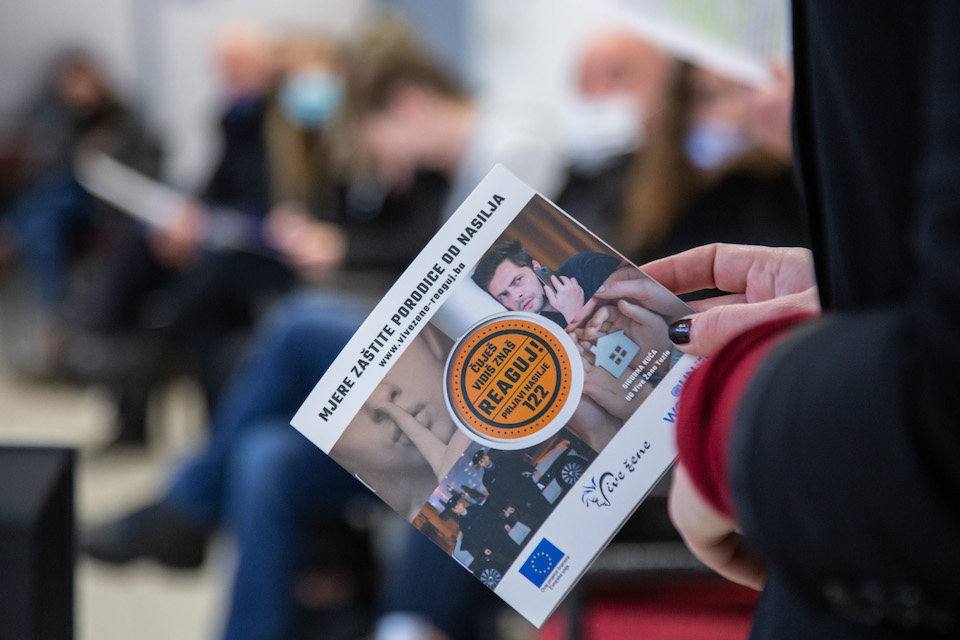Interview: “Institutions need to be supported to provide better assistance to survivors”
Date:

In 2021, 1,600 police officers from the northeastern Tuzla canton of Bosnia and Herzegovina improved their knowledge of how to protect women survivors of violence, thanks to the campaign “You hear, you see, you know – REACT,” conducted by the Ministry of Internal Affairs and the citizen association Vive Zene. Equipped with standardized guidelines, police officers also intensified their requests for protective measures to support women reporting violence, registering a 93 per cent increase. In this interview, Jasna Zečević, President of Vive Zene, shares what led to its success and identifies next steps in supporting women to report violence and receive support. The campaign was supported by the EU-funded regional programme “Implementing Norms, Changing Minds.”
What key positive changes did the campaign help bring about at institutional and individual levels?
Women who are brave enough to report violence usually seek assistance from the police first. Up until 2019, police officers only proposed some type of protection measure, such as temporary detention or a restraining order, in one in five cases. So, Association Vive Zene set out to change this trend and help police officers provide immediate and adequate assistance to women reporting violence. Police officers from all levels of the hierarchy attended our educational workshops. They also co-designed a campaign promoting the Law on Protection from Domestic Violence and available protection measures, which encouraged domestic violence victims to leave abusive situations. A number of newly reported cases were traced back to the campaign, and the police started proposing multiple or even all six protective measures to survivors. One of our beneficiaries shared with us that, after 25 years of reporting violence without success, she received immediate support during the campaign and felt protected by the police for the first time in her life.
What do you see as the main factors that contributed to this success?
The first factor in the success of the campaign was the support of the Ministry of Internal Affairs. This led to our first-ever internal monitoring of police behaviour in cases of domestic violence, which included an analysis of police work in all stations. This analysis served as the basis for creating guidelines for action in cases of domestic violence, and police officers who personally participated in the campaign adopted a stronger and more serious approach to domestic violence cases. The involvement of police officers, student volunteers and Vive Zene staff, as well as citizens in all municipalities of Tuzla canton, enabled the direct promotion of the Law on Protection from Domestic Violence and available protection measures and also increased citizens' interest and trust in the police.
What challenges remain to increasing the number of women who receive protection after reporting violence?
More remains to be done to ensure women are fully supported by institutions when facing domestic violence. Employees in institutions where women should receive support are often battling not only huge caseloads, but also their own insensitivity and prejudice – which impacts whether their reaction will be in the best interests of the victim. Doctors witness injuries, physical and emotional, but often do not report violence or refer women to other protection institutions. Social workers often lack the time and capacity to be survivors’ advocates and provide comprehensive social, health and legal protection, which is their role. On the other hand, once women reach the judicial system, institutions often lack sensitivity towards victims and look for very detailed evidence that violence really happened.
How can different stakeholders support survivors obtain protection?
Institutions need to be supported to provide better assistance to survivors: social workers need to be fast, responsive and proactive and advocate for the rights of victims of violence; medical staff who witness injuries need to both report violence and refer women to other protection institutions; the judicial system needs to support survivors throughout the process – adapting the evidence requested as proof that violence occurred, decreasing the time it takes to reach a decision and focusing on protecting the survivor instead of the perpetrator. Next steps should include creating individual protection plans for each woman reporting violence and establishing long-term, specialized police teams working on domestic violence cases, with both male and female members. In addition, mobile interdisciplinary teams should be established.
What can and should be done at the societal level to support efforts to end violence against women?
Support to women should not only be given after they have been subjected to violence, but education on these issues should begin in kindergarten and continue systematically throughout the formal education system. Media should report on domestic violence ethically and continuously. When they do report, women should receive a comprehensive and effective support-care plan. To establish an approach focused on prevention across different institutions, those who provide support should both have sufficient time to provide that support and be adequately compensated.